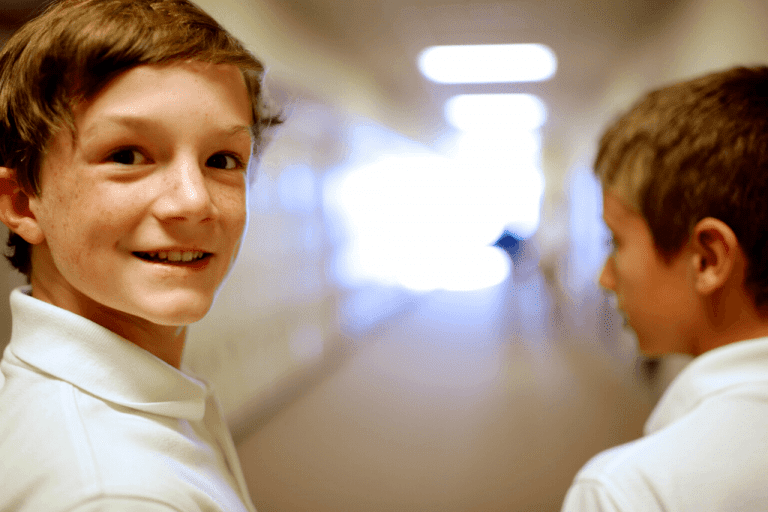Modern education seeks to train for a job or a career. Classical Christian education prepares students to be excellent learners, rigorous thinkers, and effective doers.

What is the goal of education? Many schools believe it is about training for a specific vocation. We believe that true education is about forming the soul. As you consider how to educate your child, think about how this choice will influence what your child believes and loves.
Who do you want your child to be, not just when they’re 18, but when they are 30, 40, and 50 years old? The goal of classical Christian education is formation, not merely information. We seek to work in harmony with the family, helping to prepare young people to think with depth, believe with courage, and serve with compassion.
By analyzing the great ideas of Western civilization and holding them to the light of Scripture, classical Christian students learn wisdom and virtue. Teaching for wisdom and virtue, rather than knowledge alone, alters the focus of education to who we become, not what we know.

Modern education has become focused on teaching to the test – training students to simply memorize information. Classical Christian education instead teaches God’s truth and cultivates thinking, articulate students who are able to reason well, work hard, and communicate clearly and persuasively. Classical Christian students learn in a completely different way — by asking questions, reading original texts, and using logic to reach educated conclusions.
A classical Christian education also helps students link subjects together. Although your child’s day will be divided into subject-based classes, classical teachers make clear connections between the Bible and history, history and art, art and philosophy, philosophy and culture, culture and the sciences, and so forth. Your child will learn the “big ideas” that have been proposed throughout history and see not only how they have influenced our culture but how to view them in light of God’s Word.

Service to others is a theme reinforced throughout the school—whether in class, on the playground, or at a community service event. As each child grows in the knowledge of his or her purpose as a servant of Christ, opportunities abound and teachers gently guide students to lay aside their own desires and serve their fellow man—whether it’s a classmate who is having a bad day, or a parent who needs a little extra help at home. Ultimately, a pattern of dying to self emerges even though the culture around them says the opposite.
Classical education follows the Trivium, a term used to describe the learning stages of children. By adapting the teaching method to each stage, the Trivium develops a knowledgeable, thinking, and articulate student. The three stages represented in the Trivium are Grammar (grades K-6), Logic (grades 7-8), and Rhetoric (grades 9 – 12).
Everyone loves to do what they are good at! During the Grammar phase, children are eager to memorize and we challenge them with facts that span all subjects from Bible to history to science. We use songs, chants, and rhymes to help children enjoy the learning experience. These years build a solid framework of knowledge that will serve them for life.
As your child approaches the middle school years, you may notice a new independence and a persistent question...“Why?” This point in your child's development is the perfect opportunity to train him in the art of civil discourse. By learning logic and the art of reason and debate, your child will know how to stand strong in the faith and engage others in a loving way.
Modern educational methods tend to stay the same throughout a child's K-12 years — memorize some information then reproduce it to pass a test. Classical education changes to match your child's learning stage. In high school, students become concerned with what others think of them. This is a golden opportunity to infuse wisdom and eloquence.
The best way to learn about our school is to come and visit!
Contact The Ambrose School for more information or to schedule a campus tour. We look forward to meeting you!

THE AMBROSE SCHOOL
©2025 The Ambrose School